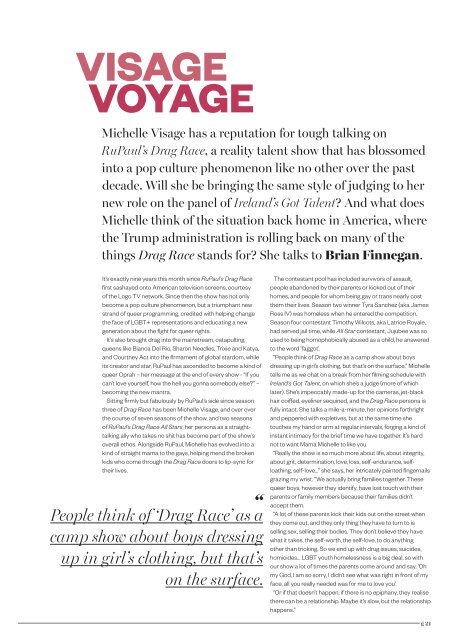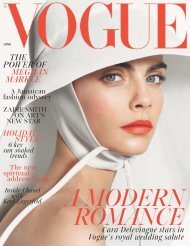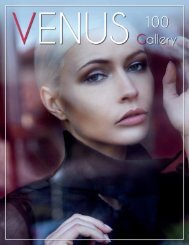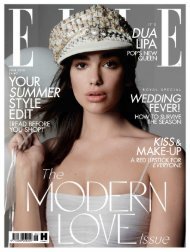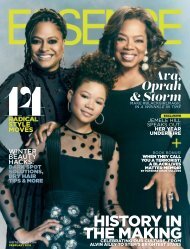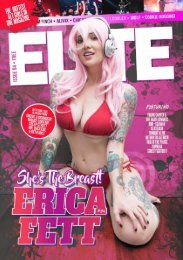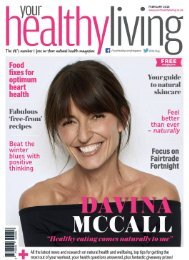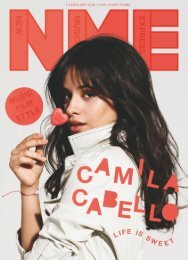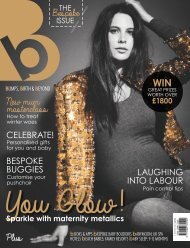You also want an ePaper? Increase the reach of your titles
YUMPU automatically turns print PDFs into web optimized ePapers that Google loves.
VISAGE<br />
VOYAGE<br />
Michelle Visage has a reputation for tough talking on<br />
RuPaul’s Drag Race, a reality talent show that has blossomed<br />
into a pop culture phenomenon like no other over the past<br />
decade. Will she be bringing the same style of judging to her<br />
new role on the panel of Ireland’s Got Talent? And what does<br />
Michelle think of the situation back home in America, where<br />
the Trump administration is rolling back on many of the<br />
things Drag Race stands for? She talks to Brian Finnegan.<br />
It’s exactly nine years this month since RuPaul’s Drag Race<br />
first sashayed onto American television screens, courtesy<br />
of the Logo TV network. Since then the show has not only<br />
become a pop culture phenomenon, but a triumphant new<br />
strand of queer programming, credited with helping change<br />
the face of LGBT+ representations and educating a new<br />
generation about the fight for queer rights.<br />
It’s also brought drag into the mainstream, catapulting<br />
queens like Bianca Del Rio, Sharon Needles, Trixie and Katya,<br />
and Courtney Act into the firmament of global stardom, while<br />
its creator and star, RuPaul has ascended to become a kind of<br />
queer Oprah – her message at the end of every show - “If you<br />
can’t love yourself, how the hell you gonna somebody else?” –<br />
becoming the new mantra.<br />
Sitting firmly but fabulously by RuPaul’s side since season<br />
three of Drag Race has been Michelle Visage, and over over<br />
the course of seven seasons of the show, and two seasons<br />
of RuPaul’s Drag Race All Stars, her persona as a straighttalking<br />
ally who takes no shit has become part of the show’s<br />
overall ethos. Alongside RuPaul, Michelle has evolved into a<br />
kind of straight mama to the gays, helping mend the broken<br />
kids who come through the Drag Race doors to lip-sync for<br />
their lives.<br />
“<br />
People think of ‘Drag Race’ as a<br />
camp show about boys dressing<br />
up in girl’s clothing, but that’s<br />
on the surface.<br />
The contestant pool has included survivors of assault,<br />
people abandoned by their parents or kicked out of their<br />
homes, and people for whom being gay or trans nearly cost<br />
them their lives. Season two winner Tyra Sanchez (aka James<br />
Ross IV) was homeless when he entered the competition.<br />
Season four contestant Timothy Wilcots, aka Latrice Royale,<br />
had served jail time, while All Star contestant, Jujubee was so<br />
used to being homophobically abused as a child, he answered<br />
to the word ‘faggot’.<br />
“People think of Drag Race as a camp show about boys<br />
dressing up in girl’s clothing, but that’s on the surface,” Michelle<br />
tells me as we chat on a break from her filming schedule with<br />
Ireland’s Got Talent, on which she’s a judge (more of which<br />
later). She’s impeccably made-up for the cameras, jet-black<br />
hair coiffed, eyeliner sequined, and the Drag Race persona is<br />
fully intact. She talks a mile-a-minute, her opinions forthright<br />
and peppered with expletives, but at the same time she<br />
touches my hand or arm at regular intervals, forging a kind of<br />
instant intimacy for the brief time we have together. It’s hard<br />
not to want Mama Michelle to like you.<br />
“Really the show is so much more about life, about integrity,<br />
about grit, determination, love, loss, self-endurance, selfloathing,<br />
self-love…” she says, her intricately painted fingernails<br />
grazing my wrist. “We actually bring families together. These<br />
queer boys, however they identify, have lost touch with their<br />
parents or family members because their families didn’t<br />
accept them.<br />
“A lot of these parents kick their kids out on the street when<br />
they come out, and they only thing they have to turn to is<br />
selling sex, selling their bodies. They don’t believe they have<br />
what it takes, the self-worth, the self-love, to do anything<br />
other than tricking. So we end up with drug issues, suicides,<br />
homicides… LGBT youth homelessness is a big deal, so with<br />
our show a lot of times the parents come around and say, ‘Oh<br />
my God, I am so sorry, I didn’t see what was right in front of my<br />
face, all you really needed was for me to love you’.<br />
“Or if that doesn’t happen, if there is no epiphany, they realise<br />
there can be a relationship. Maybe it’s slow, but the relationship<br />
happens.”<br />
g 21


